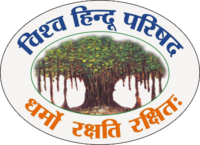
Back বিশ্ব হিন্দু পৰিষদ Assamese বিশ্ব হিন্দু পরিষদ Bengali/Bangla Vishva Hindu Parishad German Consejo Mundial Hindú Spanish Vishva Hindu Parishad Finnish Vishva Hindu Parishad French विश्व हिंदू परिषद Hindi Vishva Hindu Parishad ID विश्व हिन्दू परिषद MAI വിശ്വ ഹിന്ദു പരിഷത്ത് Malayalam
 Logo of the V.H.P, depicting a Banyan tree and the slogan dharmo rakṣati rakṣitaḥ | |
| Abbreviation | VHP |
|---|---|
| Formation | 29 August 1964[1] |
| Founder | |
| Type | Far-right[2] |
| Purpose | Hindu militancy[3][4][5][6] Hindu nationalism, Hindutva, and pan-Dharmic religions |
| Headquarters | New Delhi, India |
| Coordinates | 28°20′N 77°06′E / 28.33°N 77.10°E |
Region served | Worldwide |
Official language | Hindi |
International President | Rabindra Narain Singh[7] |
International Working President | Alok Kumar Advocate |
| Subsidiaries | |
| Affiliations | Sangh Parivar |
| Website | vhp |
Vishva Hindu Parishad (VHP) (transl. World Council of Hindus[8]) is an Indian right-wing Hindu organisation based on Hindu nationalism.[9] The VHP was founded in 1964 by M. S. Golwalkar and S. S. Apte in collaboration with Swami Chinmayananda. Its stated objective is "to organise, consolidate the Hindu society and to serve and protect the Hindu Dharma".[1] It was established to construct and renovate Hindu temples, and deal with matters of cow slaughter and religious conversion. The VHP is a member of the Sangh Parivar group,[10][11] the family of Hindu nationalist organisations led by the RSS.[12]
The VHP has been criticised for contributing to violence against Muslims in India, most notably for its role in the demolition of the Babri Masjid in 1992 over the Ayodhya dispute.[13][14]
| Part of a series on |
| Discrimination |
|---|
 |
| Part of a series on |
| Islamophobia |
|---|
 |
- ^ a b Cite error: The named reference
vhp main objectivewas invoked but never defined (see the help page). - ^ Sravasti Dasgupta (8 July 2022). "Far Right Groups in India opens Hindu Helpline". The Independent.
- ^ Valiani, Arafaat A. (11 November 2011). Militant publics in India: Physical culture and violence in the making of a modern polity. New York, NY: Palgrave Macmillan. p. 180. ISBN 978-0-230-37063-0. Retrieved 17 February 2021 – via Google Books.
In 2002, almost 2,000 Muslims were killed in carefully planned attacks by the VHP and the Bajrang Dal. The state was governed by the BJP in 2002, and some BJP representatives brazenly justified and abetted the violence.
- ^ Parashar, Swati (5 March 2014). Women and Militant Wars: The politics of injury. Routledge. p. 27. ISBN 978-1-134-11606-5. Retrieved 13 February 2021 – via Google Books.
The Sangh Parivar (literally known as the Sangh family) includes groups such as the Rashtriye Swayamsewak Sangh, the Bajrang Dal, Shiv Sena and the Vishwa Hindu Parishad. They articulate a militant Hindu nationalist politics, opposing the Muslim 'other'.
- ^ Alter, Joseph S. (1994). "Somatic Nationalism: Indian Wrestling and Militant Hinduism". Modern Asian Studies. 28 (3): 557–588. doi:10.1017/S0026749X00011860. ISSN 0026-749X. JSTOR 313044. S2CID 146291615. Retrieved 13 February 2021 – via JSTOR.
It would be anathema for the leaders of such militant groups as the RSS, Shiva Sena, and Bajrang Dal, to let a Muslim 'voice' speak to the issue of what is lacking among Hindus, much less turn—even nominally—to an Islamic model of civility to define the terms of Hindu self development.
- ^ Anand, Dibyesh (May 2007). "Anxious Sexualities: Masculinity, Nationalism and Violence". British Journal of Politics and International Relations. 9 (2): 257–269. doi:10.1111/j.1467-856x.2007.00282.x. S2CID 143765766. Retrieved 13 February 2021 – via Academia.edu.
Amrish Ji, a leader of a militant organisation Bajrang Dal, in a public speech accused Muslims of treating 'Bharat Mata' ('Mother India') as a 'dayan' ('witch') (Amrish Ji 2005).
- ^ "Rabindra Narain Singh elected as VHP president". 13 December 2021.
- ^ Jaffrelot, Christophe (2009). Hindu Nationalism: A Reader. Princeton University Press. p. 19. ISBN 978-1-4008-2803-6.
- ^ Jaffrelot, Christophe (31 December 2008). "Hindu Nationalism and the (Not So Easy) Art of Being Outraged: The Ram Setu Controversy". South Asia Multidisciplinary Academic Journal (2). doi:10.4000/samaj.1372. ISSN 1960-6060.
- ^ Jelen, Ted Gerard; Wilcox, Clyde (2002). Religion and Politics in Comparative Perspective: The One, The Few, and The Many. Cambridge University Press. p. 253. ISBN 978-0-521-65031-1.
- ^ DP Bhattacharya, ET Bureau (4 August 2014). "Communal skirmishes rising after Narendra Modi's departure from Gujarat - Economic Times". Articles.economictimes.indiatimes.com. Retrieved 14 August 2014.
- ^ "Timeline of events, including formation of VHP". RSS. Retrieved 1 April 2021.
- ^ Thomas Blom Hansen (1999). The Saffron Wave: Democracy and Hindu Nationalism in Modern India. Princeton University Press. ISBN 978-0195645743.
- ^ "VHP's social service activities". The Hindu. 18 December 2011. Retrieved 24 August 2014.